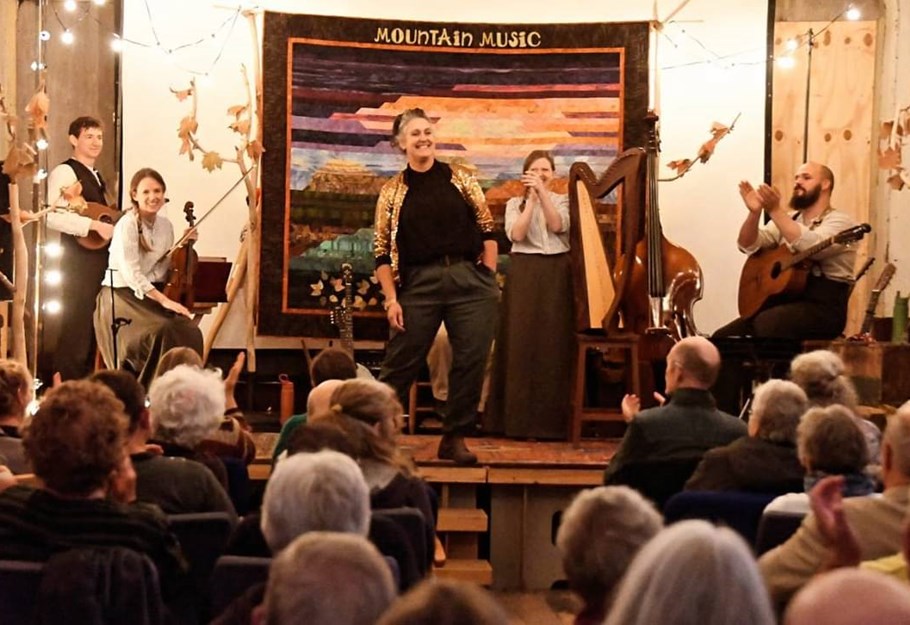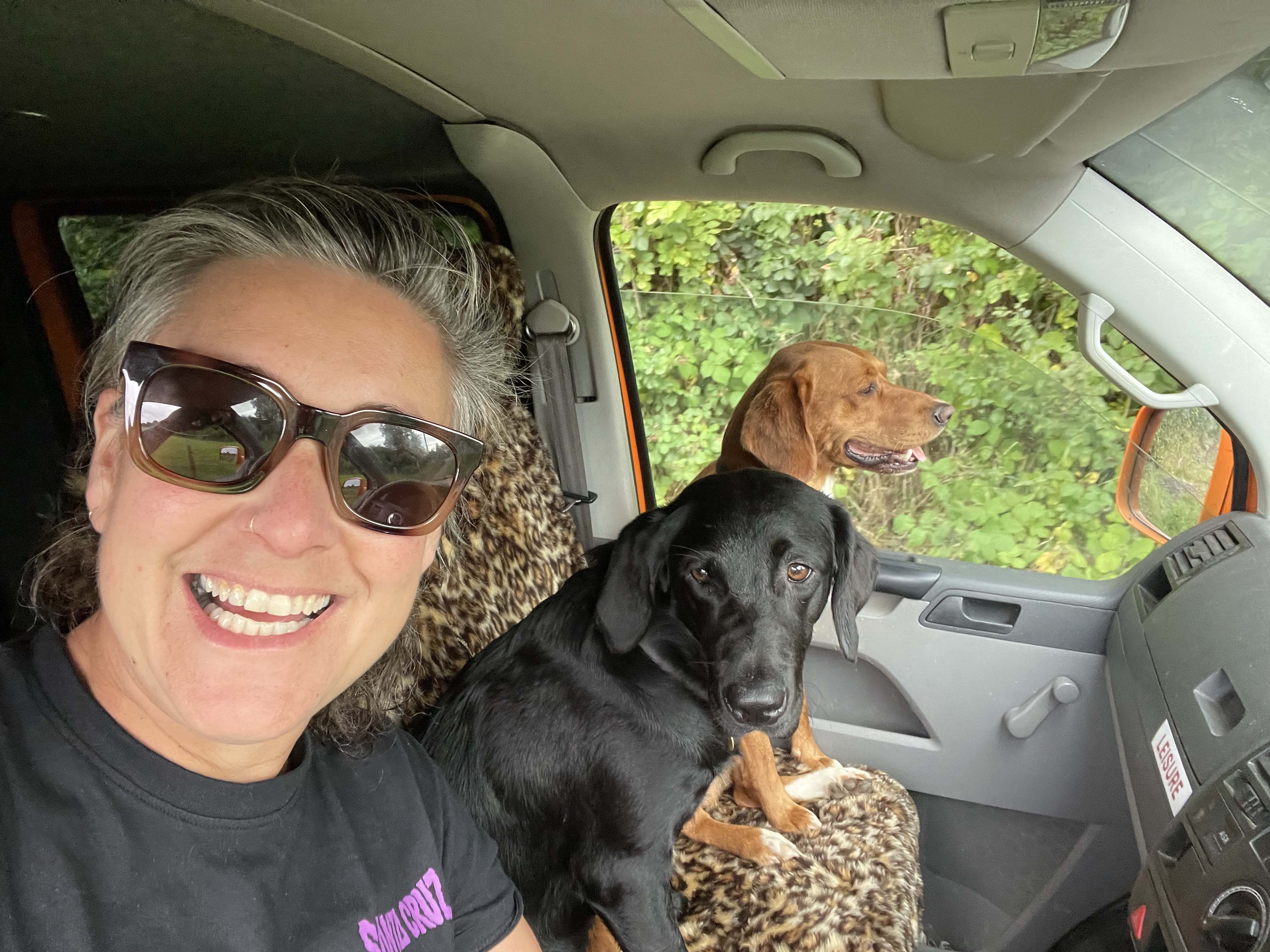- Celebrating-Somersets-Creative-And-Cultural-Practitioners-Emma-Bettridge
Celebrating Somerset’s creative & cultural practitioners... Emma Bettridge
posted 18 Mar 2024
In the latest a series of monthly blogs celebrating Somerset’s creative & cultural practitioners, our Arts Engagement & Outreach Officer Nick White meets…
...Emma Bettridge
I’ve known Wiveliscombe’s Emma Bettridge for years and we worked together almost daily online during the first lockdown in 2020. Despite this, I’ve kept a big secret from her for a long time…
…I used to be scared of her…
Long before I actually spent any time with her, when I hadn’t even met her but had been told by friends & colleagues that “she’s someone you really need to know”, I was irrationally intimidated by her.
At the time, she worked at Bristol Old Vic, leading the artist development programme, Ferment. Emma’s job was to support independent creatives and companies, giving them space & time to breathe, encouraging them to do what they do best, to focus on the process for making brilliant theatre and live performance work. In those days I really struggled to see myself as an artist. Silly me. It was a Tuesday evening late in 2012 when I saw a message in my inbox from Emma Bettridge. Subject: “Your work.” Oh no, I thought. Panic. She’s going to call me out for being a fraud. Gulp. Petrified, I agreed to meet for a coffee. We met in a trendy café near Queen’s Square and after five minutes we were laughing and gassing together about one of our favourite subjects, growing up in Somerset. I really didn’t need to panic. Emma is one of the most unintimidating, kind, supportive people you’ll ever know.
Fast-forward to early 2024. It’s raining in West Somerset but as I approach Wiveliscombe, vibrant green hills sweep down into a valley. I park up and walk to Wiveliscombe Town Hall. I know she’s there, not because the door is ajar, but because three sets of wet footprints lead up the stairs. Side by side, heavy boots and a pair of dogs. Definitely Emma Bettridge. We greet with a hug and we start chatting.
“I’ve been doing it for nearly ten years now,” she says looking around the Town Hall; a far cry from Bristol city centre but the absolute definition of what is possible when a community puts hard sweat into its own assets. “Maybe it’s time I stopped and did something else.” But there’s still so much to do. The floor. The ceiling. Running water. Toilets. Access. Emma is Chair of Trustees and takes responsibility for how the community uses the space, as much as for the renovation of the building itself. Thanks to her time at Bristol Old Vic, Pulse Festival in Ipswich before that, the NSDF festival before that, and simply because of her brilliance at connecting the dots, Emma’s connections in contemporary British theatre are enviable. Which means she can give her townsfolk access to the best of the best. In December, bespangled in a gold bomber jacket, Emma hosted the first public performance at Wiveliscombe Town Hall for over 50 years with Little Bulb Theatre (also based in Somerset).
This is what Emma does so well. She enables artists to believe in their own process, encouraging a shared experience with audiences. Sometimes an artist might try something an audience isn’t ready for. Sometimes an audience will tell an artist what they want, or what they need. Sometimes, the journey the artist and the audience go on, is symbiotic. Her current project, Stories in the Wilds, is testament to that. A light-touch experience giving children & young people the opportunity to play, walk, talk, write and create in the wilderness – whatever the wilderness means for them – the hills out the back in Wivey, from East Quay in Watchet, at Fyne Court, or in lots of school environments. She’s helping young minds normalise the process for making art. Her dog Nell is part of the experience. “Red can’t come, he’s too bouncy. But Nell is calming. Animals give children something to relate to. They’re alive. You mustn’t hurt a dog, or a horse. Kids know that. Nature is the same. Put your phone on airplane mode, turn off the noise, and then just start creating.” A young girl was getting frustrated at not being able to find the written words for a task she was taking part in. Emma didn’t intervene but gave the girl space to find her own solution. She drew a flower, and she was happy.
Emma loves words. Her beautiful picture books, Goodbye Hobbs and Red Is Home (illustrated exceptionally by Josephine Birch) precede her teen novel, The Ranch at the End of the World which is being published in the autumn. “Suddenly I’m a children’s author,” she muses. “But also I’m not,” she corrects herself assertively. “I’m a creative person who happens to be writing children’s books at the moment.”

Being a maker is highly exposing; there’s often a lot of vulnerability that comes from the creative process that manifests as imposter syndrome, where you think that everyone’s judging you for the quality of the work you produce. The reality is far from that truth. First, everyone experiences this feeling. Second, no-one’s judging. Third, it’s our collective responsibility to make culture happen wherever, however. Different people enjoy different things. The skill of the artist is to give an audience what they want, what they know, what they like, or to help them experience something different, safely.
Whether it’s on the edges of the wilds of Exmoor, within the frame of a Zoom box, ensconced in a black box theatre studio, around the dust of Wiveliscombe Town Hall, or somewhere else, make the space and time to enjoy the process. As Emma says as we part, it’s all about taking a punt.
| Monday | Tuesday | Wednesday | Thursday | Friday | Saturday | Sunday |
|---|---|---|---|---|---|---|
|
|
|
|
||||
|
|
|
|
|
|
|
|
|
|
|
|
|
|
|
|
|
|
|
|
|
|
|
|
|
|
|
|
|
|
|
|

 My Account
My Account
 Basket
Basket
 Log In
Log In
 GIFT VOUCHER
GIFT VOUCHER
Conversations